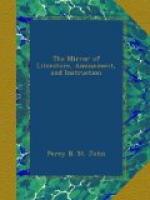But, in those “good old times,” abuses in institutions formed for the best and wisest purposes were not uncommon; and in the case of St. Cross, so early did evil begin to counteract good, that, in little more than two centuries from its foundation, the revenues assigned for the annual fulfilment of the founder’s wishes, were grossly misapplied. They had increased in value, and the masters and brethren of the hospital of St. John of Jerusalem, who were guardians and administrators, seized the surplus and put it into their own pockets. Bishop Wykeham, who was appointed to the see of Winchester, in 1366, set about the reform of these abuses, which he was enabled to do by his canonical jurisdiction:—“he determined that the whole revenue of the hospital should be dedicated to the poor, as was the intention of the founder, and having in vain tried admonition and remonstrance, summoned the four masters to appear before him and answer for their stewardship. They were bold enough to set Wykeham at defiance, and availed themselves of all the subtleties of the law, and of all manner of evasion, by appeal and otherwise, to thwart and throw him. The upright bishop persisted—he called them to the severest account—had them fined, and till they made restitution, excommunicated—and finally restored the whole endowment to its primitive purpose."[4]
The propriety and good effects of Wykeham’s restoration were so apparent, that his successor, Cardinal Beaufort, having determined to engage in some permanent charity, resolved rather to enlarge this institution, than to found a new one. “He therefore endowed it for the additional support of two priests, and thirty-five poor men, who were to become residents, and three hospital nuns, who were to attend upon the sick brethren: he also caused a considerable portion of the hospital to be rebuilt."[5] Of the present establishment we shall presently speak in detail. “The hospital,” says Lowth, “though much diminished in its revenues, by what means I cannot say, yet still subsists upon the remains of both endowments.”




